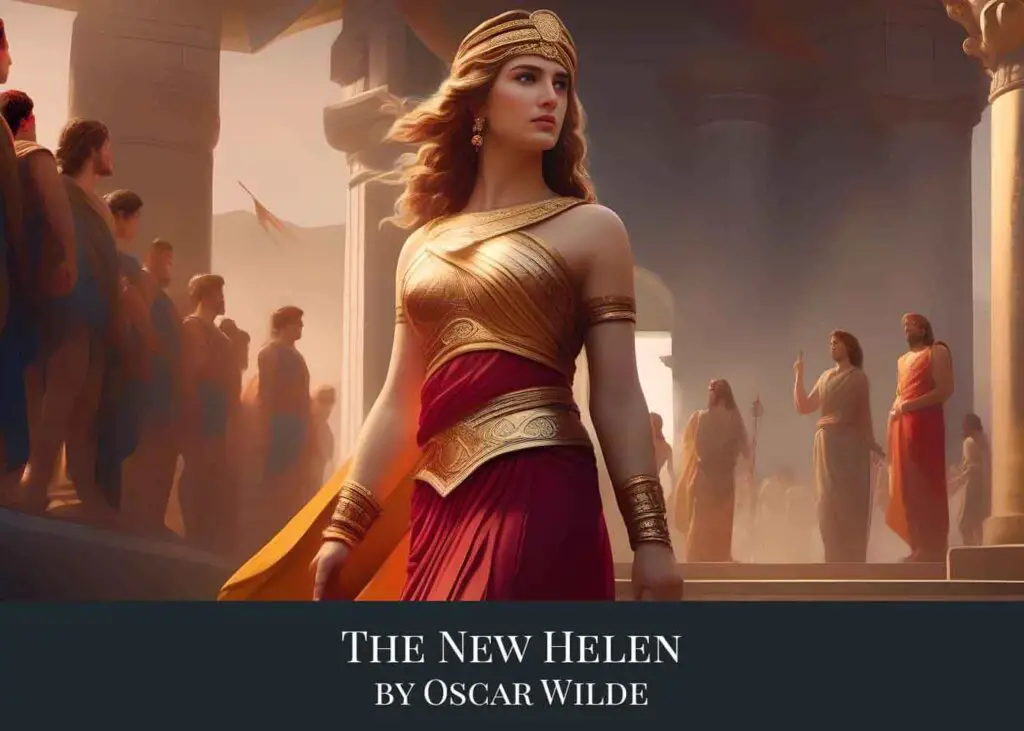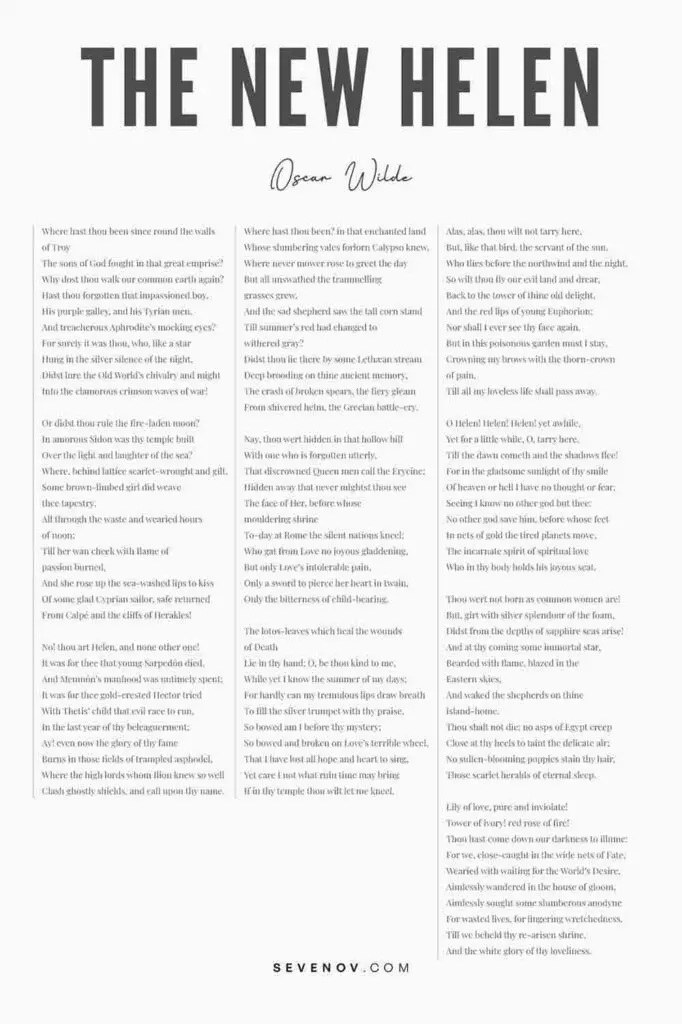
The New Helen by Oscar Wilde
“The New Helen” is a captivating piece by Irish playwright, poet, and author Oscar Wilde, delving deep into the mythic allure of Helen of Troy and her lasting influence on human sentiments. Collected in Wilde’s Poems, this work beautifully encapsulates his penchant for merging classical references with profound emotional introspection. For those eager to explore this and other poetic masterpieces by Wilde, the Poems ebook is available free at PageVio.
1. The Poem
Where hast thou been since round the walls of Troy
The sons of God fought in that great emprise?
Why dost thou walk our common earth again?
Hast thou forgotten that impassioned boy,
His purple galley and his Tyrian men
And treacherous Aphrodite’s mocking eyes?
For surely it was thou, who, like a star
Hung in the silver silence of the night,
Didst lure the Old World’s chivalry and might
Into the clamorous crimson waves of war!
Or didst thou rule the fire-laden moon?
In amorous Sidon was thy temple built
Over the light and laughter of the sea
Where, behind lattice scarlet-wrought and gilt,
Some brown-limbed girl did weave thee tapestry,
All through the waste and wearied hours of noon;
Till her wan cheek with flame of passion burned,
And she rose up the sea-washed lips to kiss
Of some glad Cyprian sailor, safe returned
From Calpé and the cliffs of Herakles!
No! thou art Helen, and none other one!
It was for thee that young Sarpedôn died,
And Memnôn’s manhood was untimely spent;
It was for thee gold-crested Hector tried
With Thetis’ child that evil race to run,
In the last year of thy beleaguerment;
Ay! even now the glory of thy fame
Burns in those fields of trampled asphodel,
Where the high lords whom Ilion knew so well
Clash ghostly shields, and call upon thy name.
Where hast thou been? in that enchanted land
Whose slumbering vales forlorn Calypso knew,
Where never mower rose at break of day
But all unswathed the trammelling grasses grew,
And the sad shepherd saw the tall corn stand
Till summer’s red had changed to withered grey?
Didst thou lie there by some Lethæan stream
Deep brooding on thine ancient memory,
The crash of broken spears, the fiery gleam
From shivered helm, the Grecian battle-cry?
Nay, thou wert hidden in that hollow hill
With one who is forgotten utterly,
That discrowned Queen men call the Erycine;
Hidden away that never mightst thou see
The face of Her, before whose mouldering shrine
To-day at Rome the silent nations kneel;
Who gat from Love no joyous gladdening,
But only Love’s intolerable pain,
Only a sword to pierce her heart in twain,
Only the bitterness of child-bearing.
The lotus-leaves which heal the wounds of Death
Lie in thy hand; O, be thou kind to me,
While yet I know the summer of my days;
For hardly can my tremulous lips draw breath
To fill the silver trumpet with thy praise,
So bowed am I before thy mystery;
So bowed and broken on Love’s terrible wheel,
That I have lost all hope and heart to sing,
Yet care I not what ruin time may bring
If in thy temple thou wilt let me kneel.
Alas, alas, thou wilt not tarry here,
But, like that bird, the servant of the sun,
Who flies before the north wind and the night,
So wilt thou fly our evil land and drear,
Back to the tower of thine old delight,
And the red lips of young Euphorion;
Nor shall I ever see thy face again,
But in this poisonous garden-close must stay,
Crowning my brows with the thorn-crown of pain,
Till all my loveless life shall pass away.
O Helen! Helen! Helen! yet a while,
Yet for a little while, O, tarry here,
Till the dawn cometh and the shadows flee!
For in the gladsome sunlight of thy smile
Of heaven or hell I have no thought or fear,
Seeing I know no other god but thee:
No other god save him, before whose feet
In nets of gold the tired planets move,
The incarnate spirit of spiritual love
Who in thy body holds his joyous seat.
Thou wert not born as common women are!
But, girt with silver splendour of the foam,
Didst from the depths of sapphire seas arise!
And at thy coming some immortal star,
Bearded with flame, blazed in the Eastern skies,
And waked the shepherds on thine island-home.
Thou shalt not die: no asps of Egypt creep
Close at thy heels to taint the delicate air;
No sullen-blooming poppies stain thy hair,
Those scarlet heralds of eternal sleep.
Lily of love, pure and inviolate!
Tower of ivory! red rose of fire!
Thou hast come down our darkness to illume:
For we, close-caught in the wide nets of Fate,
Wearied with waiting for the World’s Desire,
Aimlessly wandered in the House of gloom,
Aimlessly sought some slumberous anodyne
For wasted lives, for lingering wretchedness,
Till we beheld thy re-arisen shrine,
And the white glory of thy loveliness.

Size: 8″ x 12″ (2:3 ratio)
Format: PDF
Copyright information: For personal use only
Note: Actual poster background color is white. For the sample poster, the background is made gray for illustration purpose.
2. The New Helen Analysis
This poem addresses Helen of Troy, the legendary figure from ancient Greek mythology known for her unparalleled beauty which led to the Trojan War. The speaker reflects on her timeless allure, impact, and presence in various mythologies and histories. Let’s break down the poem section by section:
First section – The speaker questions where Helen has been since the time of the Trojan War and ponders her role in the event. The speaker suggests that Helen’s allure might have been the force that drew “the Old World’s chivalry and might” into the war.
Second section – The speaker speculates about other places Helen might have been. Perhaps she had a temple in Sidon where a girl weaved tapestries for her, or she might have been an enchanting force for sailors returning from their voyages.
Third section – The speaker asserts that Helen is unmistakably the same Helen of the Trojan tales. The deaths of heroes like Sarpedôn, Memnôn, and Hector occurred because of her. Even in the afterlife, the heroes remember and call upon her.
Fourth section – The speaker further speculates on Helen’s whereabouts. Perhaps she resided in an enchanted land where time seemed to stand still, or she reflected upon her past filled with the sounds and sights of war.
Fifth section – Helen might have been hidden with a forgotten queen, away from the gaze of another deity, possibly a reference to Venus or Mary (as the poem refers to Rome and child-bearing pain). This section touches on the tragedies and burdens that love can impose.
Sixth section – The speaker pleads with Helen for her compassion and kindness. He feels devastated by love and wishes to be comforted by Helen’s presence.
Seventh section – The speaker laments that Helen won’t stay and will return to her favored places or people. He feels trapped in a “poisonous garden-close”, symbolizing an agonizing existence without her.
Eighth section – The plea continues. The speaker desires Helen’s presence, as it brings him hope and banishes fears. He idolizes her, considering her the only god he acknowledges, save for another deity that symbolizes pure love.
Ninth section – Helen’s divine and unique birth is highlighted. She emerged from the sea, symbolizing her ethereal and otherworldly nature. The speaker insists that Helen will not die like mortals do, as she’s beyond earthly harm.
Tenth section – The poem concludes by praising Helen as the embodiment of pure love and beauty. The speaker suggests that humans were aimlessly wandering in darkness until they witnessed the “white glory” of Helen’s beauty, which brought light and purpose to their lives.
The poem weaves together various mythological references, both Greek and Roman, to highlight Helen’s everlasting allure and the profound influence she has on the mortal world. The speaker’s intense admiration for Helen underscores the timeless fascination humanity has with idealized beauty and love.
3. Conclusion
Captivated by “The New Helen?” Consider discovering additional poems written by Oscar Wilde.




